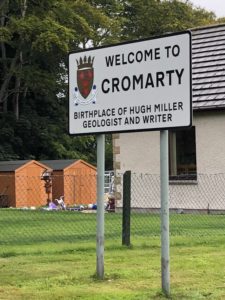 On a cruise, each day in port offers a buffet of cruise-sponsored excursions.
On a cruise, each day in port offers a buffet of cruise-sponsored excursions.
Today, in Invergordon, Scotland that buffet included Scotch distilleries, castles, and of course, Loch Ness.
For the GSB team, I offered the Hugh Miller Excursion, subtitled, “The Kingdom Men Who Changed the World Tour.”
As I laid it out for them, I could see they were none too excited.
The Wife and I had done the distillery thing and Scotch tasting.
We had been to all the castles on the excursions.
We had been to Loch Ness numerous times and as recently as three months ago.
Yet the wife chose Loch Ness and Urquhart Castle, and the others followed. “Maybe we will see Nessie,” I’m sure I heard someone say.
“Let them go,” I thought. Let them tour the chachka-filled, tourist trap, gift shops. Let them pay the admission at the Loch Ness museum to learn we still don’t know whether there is or ever was a Loch Ness monster. I don’t care. Nessie may have changed Scottish tourism, but Hugh Miller changed the world.
So, I rented a car, got out on the left side of the road, and headed south on the A9. The first stop was Brodie Castle, former home of the fascinating but controversial, Alexander Brodie, the 15th Brodie, also known as the “Good Lord Brodie.”
Alexander Brodie (1617-1680), was a Covenanter, and was sent as the commissioner to persuade Charles II to sign the National Covenant. He also led a party, who on a Puritan iconoclastic mission, destroyed some paintings in a local Catholic church. He was a judge who presided over witch trials, and he refused the invitation of Oliver Cromwell to meet with him to discuss the union of England and Scotland. Brodie apparently loved the Lord and kept detailed journals. To the consternation of historians and the curator I spoke to at the castle, the diaries are difficult to read because they contain his thoughts about the Lord and his prayerful strugglies about important decisions related to historical events rather than the historical events themselves. In other words, they have spiritual value but little historical value.
The library in the castle was magnificent and Brodie’s diaries were there on the bookshelf, but the curator told me she couldn’t let me look at them without the permission of the National Trust of Scotland, and special gloves, etc. etc. As soon as I left I did a search on the Internet, and sure enough, there is a free download of Brodie’s diaries on the Internet. I downloaded the PDF, took a quick peak, and then headed on toward the ultimate destination of this excursion, Cromarty, the birthplace of Hugh Miller.
Hugh Miller (1802-1856), was a Kingdom man, by any definition. He started his career as a stone mason but self-taught became one of the greatest geologists of his time. In addition, he edited a paper in Edinburgh, The Witness, arguing against liberals and conservatives on the issues of the day from a Kingdom perspective. He became one of the greatest writers of his age, making the science of Geology accessible to the masses and explaining to them how the fingerprints of God are in the rocks and His creation. He also brilliantly disputed the theory of evolution at the very time Darwin was still writing Origin of the Species.
If that was not enough for one man, he and Thomas Chalmers were at the forefront of the Disruption, the movement that led to the creation the Free Church of Scotland. As the exhibit in his family home in Cromarty, now a museum, stated, “In the 1840s and 1850s, Hugh was reckoned among the greatest Scotsmen alive, famous as a scientist, agitator for reforms, and champion of the Christian faith.” Sadly, Miller committed suicide at age 54. The circumstances are still mysterious but seem related to a disease he contracted working in the stone quarries when he was younger.
Both Brodie and Miller were fully engaged with God and fully engaged in the world. It is what we are all called to be, except for, of course, that part about suicide. GS
